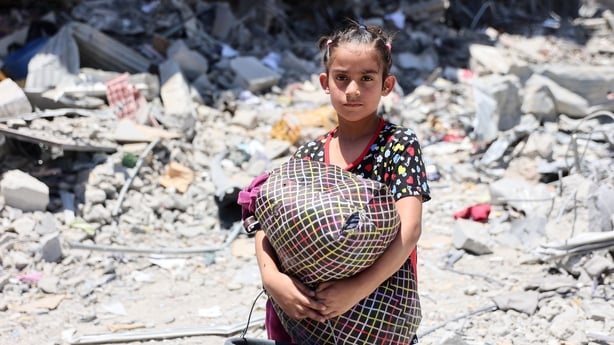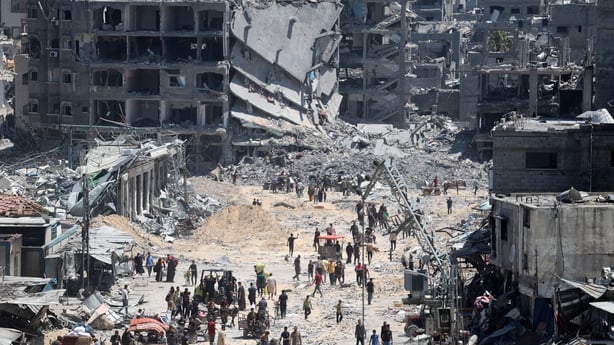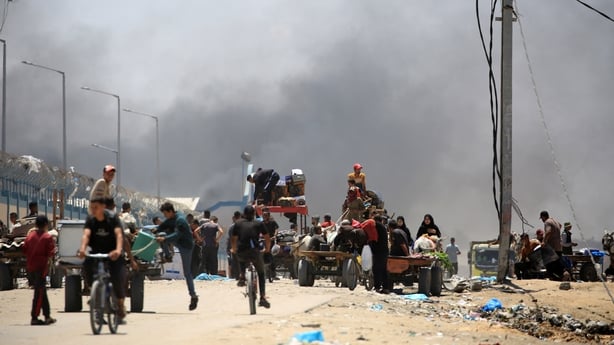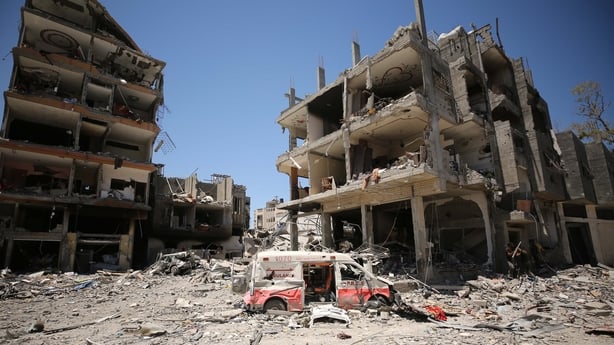US President Joe Biden has said that Israel has offered a new roadmap towards a permanent peace in Gaza, urging Hamas to accept the deal as it was "time for this war to end".
In his first major address outlining a solution to the eight-month conflict, Mr Biden said the proposal started with a six-week phase that would see Israeli forces withdraw from all populated areas of Gaza.
"It's time for this war to end, for the day after to begin," Mr Biden said in a televised address from the White House, adding that "we can't lose this moment" to seize the chance for peace.
"Israel has offered a comprehensive new proposal. It's a roadmap to an enduring ceasefire and the release of all hostages," he said.
The 81-year-old Democrat put particular pressure on the Palestinian militant group Hamas, whose attack on key US ally Israel on 7 October last year prompted the conflict in Gaza.
"Hamas needs to take the deal," said Mr Biden, who has supported Israel with military aid since the conflict began.
Mr Biden said the first six-week phase would include a "full and complete ceasefire, withdrawal of Israeli forces from all populated areas of Gaza, release of a number of hostages, including women, the elderly, the wounded, in exchange for release of hundreds of Palestinian prisoners".
Israel and the Palestinians would then negotiate during those six weeks for a lasting ceasefire but the truce would continue if the talks remained under way, Mr Biden said.

"As long as Hamas lives up to its commitments, a temporary ceasefire would become, in the words of the Israeli proposal, the cessation of hostilities permanently," Mr Biden added.
However, Israeli Prime Minister Benjamin Netanyahu said the Gaza war will not end until the "elimination" of Hamas's capacity to govern and make war.
"The prime minister authorised the negotiating team to present an outline for achieving this goal, while insisting that the war will not end until all of its goals are achieved, including the return of all our hostages and the elimination of Hamas' military and governmental capabilities," Mr Netanyahu's office said in a statement.
Hamas released a statement saying they positively view a proposal announced by President Biden for a permanent ceasefire in Gaza.
"Hamas confirms its readiness to deal positively and in a constructive manner with any proposal that is based on the permanent ceasefire and the full withdrawal [of Israeli forces] from the Gaza Strip, the reconstruction [of Gaza], and the return of the displaced to their places, along with the fulfillment of a genuine prisoner swap deal if the occupation clearly announces commitment to such deal," the group said in a statement.
Hamas insists that any ceasefire should be permanent.
The group said earlier that it had informed mediators it would only agree to a "comprehensive" truce agreement including a hostage for prisoner swap if Israel halts its "aggression".
Ismail Haniyeh, the head of Hamas's Qatar-based political office, reiterated that the group's core demands, including a permanent ceasefire and full Israeli withdrawal, "are non-negotiable".

Mr Biden did not significantly address Israel's assault on the southern Gaza city of Rafah, into whose central area the Israeli army said its troops had pushed into despite international objections.
He acknowledged however that Palestinians were enduring "sheer hell".
The US president has been under growing pressure over his support for Israel since a deadly strike on Rafah set ablaze a crowded camp on Sunday.
Gaza officials said 45 people were killed in the strike and about 250 people were wounded.
However, the White House said this week that while the Israeli strike was "devastating," it did not breach Mr Biden's red lines for withholding weapons deliveries to the key US ally.
Rafah operation
It comes as the Israeli army said its troops have pushed into central Rafah.
Israel first sent tanks and troops into Rafah from the city's east in early May, ignoring concerns over the safety of displaced Palestinian civilians sheltering in the city on the Egyptian border.
Soldiers were operating "in central Rafah" where they uncovered rocket launchers and tunnel shafts and dismantled a Hamas weapons storage facility, the army claimed in its latest statement.
Witnesses reported seeing Israeli air strikes in the Rafah area as well as troop movements at the Al-Awda roundabout, Yibna camp and Kir intersection in central Rafah.

In central Gaza, the army said it was "intensifying operations" and had carried out air strikes that "eliminated several terrorists" operating near Israeli troops.
Many civilians have left Rafah, taking their belongings on their shoulders, in cars or on donkey-drawn carts.
Before the Rafah offensive began, the United Nations said up to 1.4 million people were sheltering in the city.
Since then, one million have fled the area, according to UNRWA.
The United Nations has warned of looming famine in Gaza.
The Israeli seizure of the Rafah crossing has slowed sporadic deliveries of aid for Gaza's 2.4 million people and effectively shuttered the territory's main exit point.
Israel said at the weekend that aid deliveries had been stepped up.
But US Secretary of State Antony Blinken acknowledged that the humanitarian situation was "dire" despite US efforts to bring in more assistance.
"We've seen changes - some positive changes, but the net effect is not there," Mr Blinken told reporters in Prague.
Jordan announced it will host a summit on 11 June, jointly organised with Egypt and the United Nations, bringing together aid agency chiefs and heads of donor governments to discuss the humanitarian response.
Hamas' 7 October attack on southern Israel, resulted in the deaths of 1,189 people, mostly civilians, according to an AFP tally based on Israeli official figures.
Militants also took 252 hostages, 121 of whom remain in Gaza, including 37 the army says are dead.

Israel's retaliatory offensive has killed at least 36,284 people in Gaza, mostly civilians, according to the territory's health ministry.
A medical official at Al-Aqsa Martyrs Hospital in central Gaza's Deir al-Balah said eight people, including two children, were killed in an Israeli airstrike that hit a house in Al-Bureij refugee camp.
Another source at Nuseirat's Al-Awda Hospital reported three deaths in a strike on a car.
In northern Gaza, witnesses said that after carrying out a three-week long operation in the town of Jabalia and its neighbouring refugee camp, troops had ordered residents of parts of nearby Beit Hanoun to evacuate ahead of an imminent assault.
The military announced the deaths of two soldiers in Gaza, taking to 294 the number of Israeli troops killed since the start of ground operations in late October.
